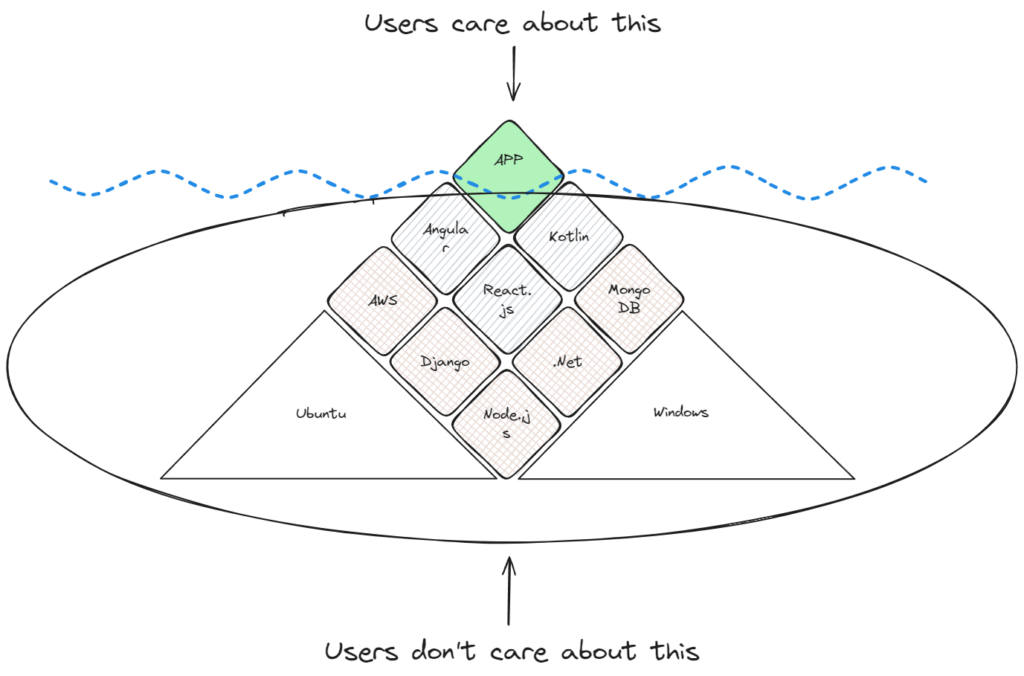Developers are the architects behind the scenes in every technology around us, shaping solutions that not only transform businesses but also redefine our daily lives. Beyond the intricate coding and technical brilliance lies a crucial aspect often overlooked – the adoption of a product mindset.
Imbuing developers with a product mindset can truly deliver transformative results since it enables and empowers developers to have an active participation in the product they are designing beyond technical aspects. At Arionkoder we take pride in instilling this mindset in our developers and throughout the company as something that sets us apart and adds exceptional value.
The essence of a product mindset and why it matters

You might wonder why developers should embrace a product mindset when there are dedicated product managers involved in their projects. The answer is that while product managers navigate the broader landscape, it’s the developers who weave the magic, turning concepts into reality. Amid the complexities of technology, the end user remains the focal point. Here’s why adopting a product mindset matters:
- Developers with a product mindset create user-centric solutions by aligning development efforts with user needs, which in turn results in more engaging and satisfying solutions.
- They are also more adaptable and relevant, remaining responsive to user feedback and market trends in a way that makes their products competitive.
- Those developers have a strategic outlook: going beyond technicalities allows for informed decisions that benefit the overall product.
- They foster an innovative environment where creativity leads to novel solutions for user problems.
- They promote a collaborative culture where all members share a unified vision and grasp of the product objectives.
“Good teams understand who their key stakeholders are, they understand the constraints that these stakeholders operate in, and they are committed to inventing solutions that not only work for users and customers, but also work within the constraints of the business.”
Jeff Patton, User Story Mapping
Embracing the Right Approach
Developers sometimes erroneously limit their role to gathering and developing requirements. But in reality it’s more than that: it’s about enhancing lives through technology. At Arionkoder, we guide our developer teams in cultivating a product mindset through various means:
- Make developers part of the discovery process to improve their understanding of the problems that need solving and why. This involves user research, market analysis, and brainstorming sessions. For example, before coding a fitness app, developers should participate in user interviews or survey analyses to understand their target user’s struggles and use those insights to shape the app’s features and address real user needs effectively.
- Help them shift from task to product focus by emphasizing that their work is not just a series of isolated tasks, but rather integral components of a larger narrative that contributes to the overall user experience. For instance, when coding a feature for an e-commerce platform, developers should consider how it enhances the overall shopping experience.
- Train developers to prioritize a user perspective. Regularly analyzing how each decision impacts the end user creates a healthy habit that ensures that the user’s needs and experiences are at the forefront of the development process instead of just the requirements and technical specs. For example, when optimizing a mobile app’s performance, lead developers to consider how the changes will affect the user’s experience: in this case, reducing load times not only improves technical metrics but also enhances user satisfaction by providing a smoother, more enjoyable app experience.
- Foster collaboration across functions to gain new perspectives that result in a more holistic product. Engaging with the design team, for example, helps developers grasp UI/UX concepts, enhancing the technical aspects of the product.
- Encourage developers to align with business objectives, to have a broader understanding of what the goals are and ensure their technical decisions support those goals. Let’s imagine the business goal for a project is to increase user engagement: by giving developers this insight, they have what they need to focus on creating features that encourage user interaction, like a community forum or personalized recommendations.
- Nurture problem-solving skills in developers. They approach each task as a chance to creatively solve problems, considering both user needs and business challenges. For instance, if users report difficulty navigating a website, solutions should go beyond just coding solutions and into considering what navigation structure makes the most sense for those users and their browsing behavior.
- Encourage measuring success through user satisfaction. They gauge the success of their work based on how well it meets user needs and expectations, not just technical performance. So after your developers deploy a new feature, actively seek user feedback. If users find the feature confusing or not useful, consider it an area for improvement, regardless of its technical sophistication.
- Prompt developers to embrace ownership and responsibility. They take responsibility for the product as a whole, not just the specific tasks they do. For example, if developers notice a recurring bug that affects user experience but falls outside their direct responsibilities, they should still take the initiative to report it, propose a solution, or collaborate with the team to resolve it.
The challenge of grasping a product mindset is worth it
Innovation often arises from engineers with deep insights into business and user challenges. Dedicating time to understanding business objectives and user needs paves the way for transformative solutions that not only create coherent and thoughtful products but also accelerate the professional growth of developers.
If this resonates with you, join us as we revolutionize entire industries together with our combination of Science, Design and Engineering!
